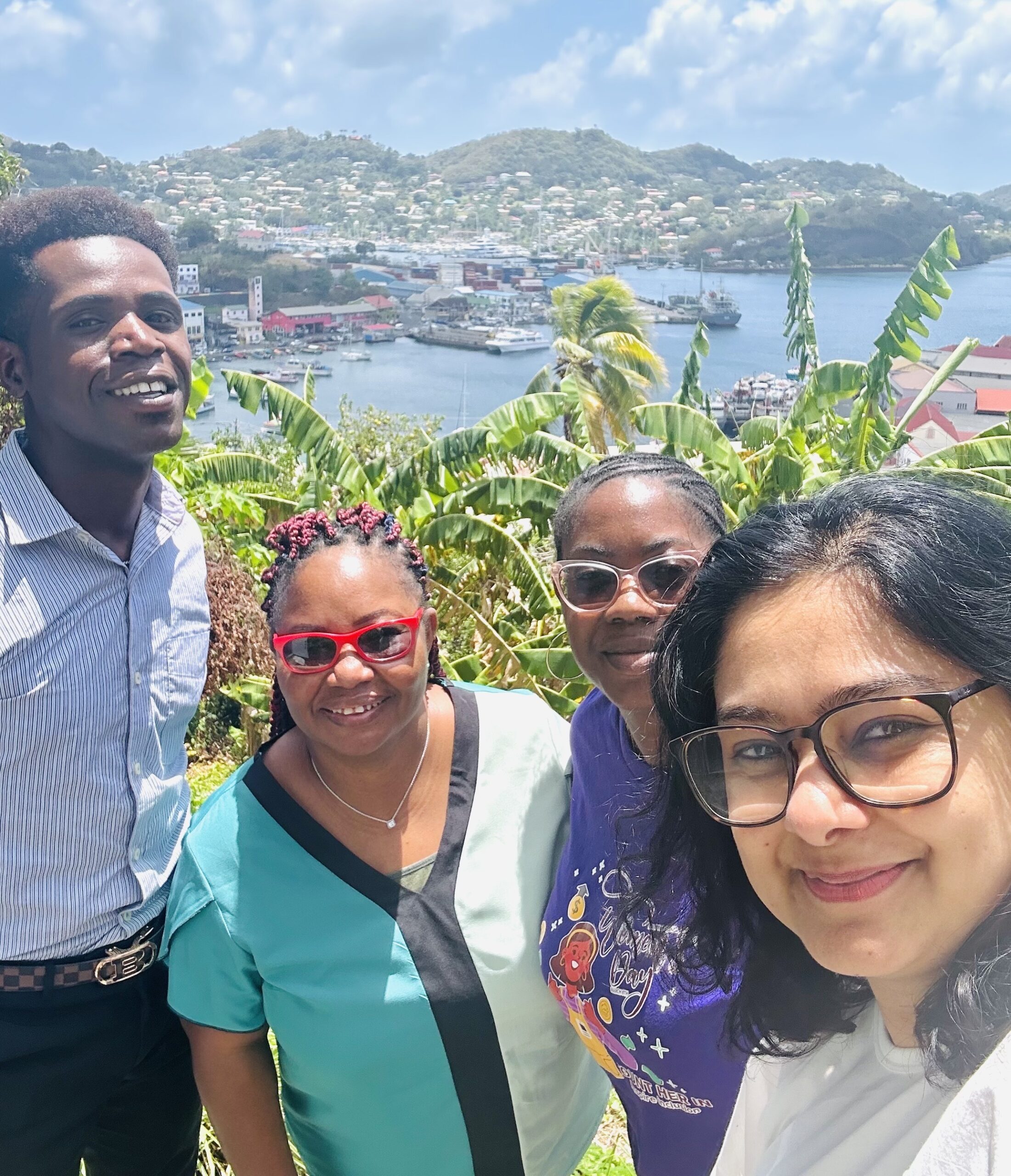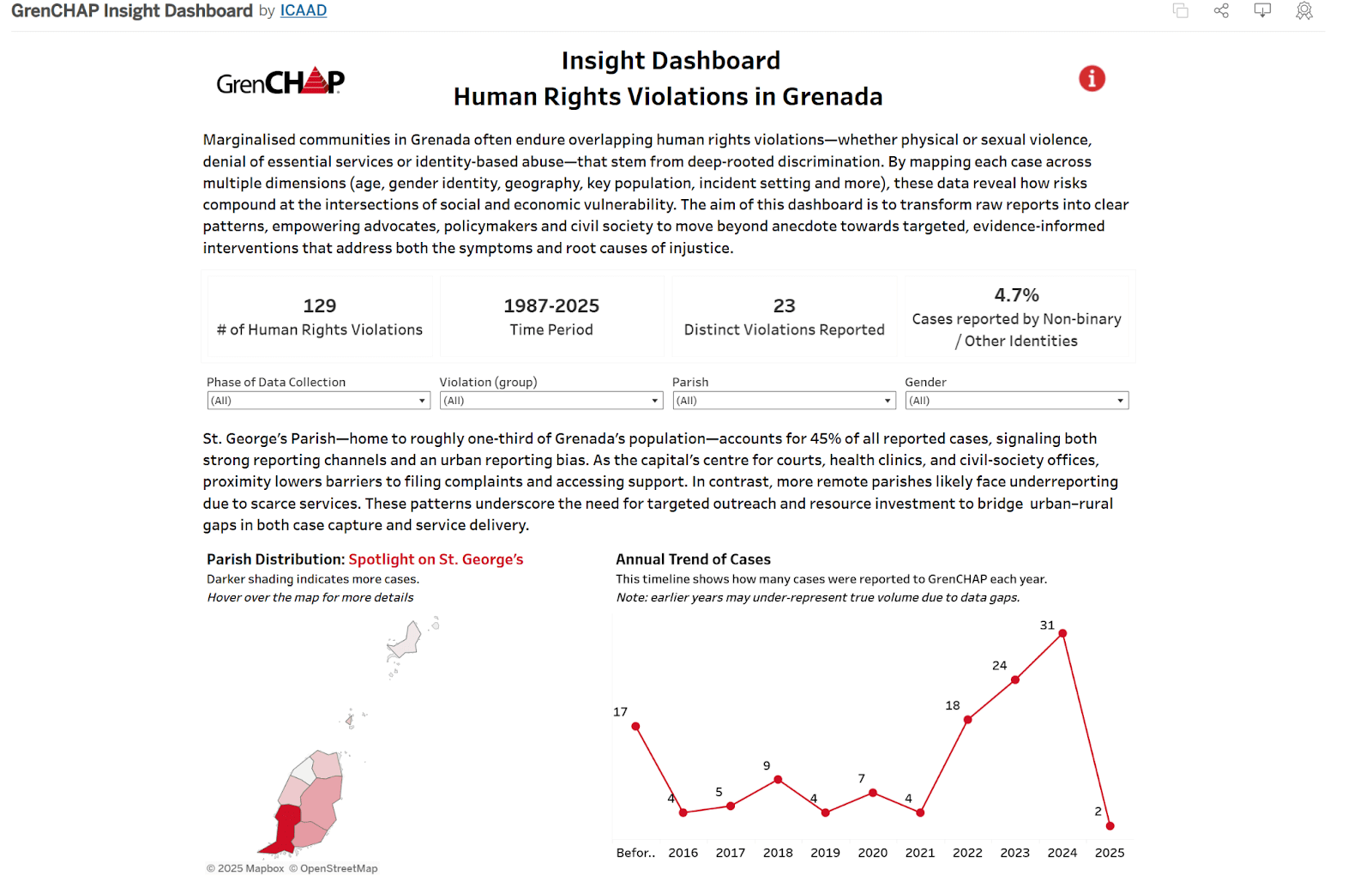At ICAAD, we believe systemic change grows through long-term, partner-led relationships. Our theory of change is grounded in relational systems transformation: listening first, co-building slowly, and moving at the pace of trust.
This is what that looks like in practice, told through our journey with GrenCHAP in Grenada.

Across Grenada and much of the Caribbean, Civil Society Organisations (CSOs) struggle with fragmented, paper-based systems that lack secure infrastructure for tracking human rights violations — especially for LGBTQ+ people, persons living with HIV (PLHIV), and persons with disabilities. Without centralized, confidential platforms, CSOs can’t reliably aggregate data, identify trends, or generate evidence-based advocacy. This lack of data weakens accountability, reinforces exclusion, and makes it harder to push for systemic reform.
“With the support of ICAAD, we have taken a significant step toward closing the data gap. We transitioned from documenting on paper and later uploading to a computer, to now entering information directly into our system in real time. This transformation not only streamlines the process but also empowers us with instant analysis, improving both efficiency and accuracy.”
- Kerlin Charles, Executive Director, GrenCHAP
GrenCHAP is a sexual and reproductive health and human rights CSO that serves marginalized communities in Grenada. For over 15 years, the organization has created safe spaces, provided critical services, and trained frontline workers to respond more effectively to the needs of these communities. Their advocacy is deeply intersectional, rooted in community voice, and focused on ensuring that laws and policies reflect the lived realities of those most excluded.
Listening First
We first connected with GrenCHAP’s Executive Director, Kerlin, in August 2023, ahead of ICAAD’s first in-country visit. At the time, GrenCHAP was already one of the most visible LGBTQ+ rights organizations in the region, advocating for legislative reform and challenging discrimination in housing, healthcare, and policing. But like many small CSOs, they were overburdened and under-resourced, operating with mostly paper records and without access to data analysis tools. While they reported cases into the Shared Incident Database (SID), they couldn’t disaggregate their data or use it to inform advocacy or community engagement.
Kerlin didn’t need convincing that data mattered. She knew that tracking human rights violations, referrals, and program outreach wasn’t just about donor reporting. It’s also the evidence base for changing narratives, informing advocacy, and protecting lives. She also recognized that building a data culture isn’t about plugging in a new system overnight. It requires time, capacity, and care. She knew that ICAAD wasn’t just there to deliver a tool—we were there to walk alongside her team and build what made sense for them.
Trust Before Tools
During ICAAD’s in-country visit in September 2023, we met with Kerlin and her team to understand the breadth of what they were tracking: HIV testing consents, counseling referrals, training attendance, social media engagement, and much more. Much of it was recorded on paper. Some lived in scattered spreadsheets or were being entered into platforms like the regional Shared Incident Database (SID) that CSOs couldn’t analyze or control. Yet, they were collecting data.What they needed was infrastructure that made that work visible and sustainable.
Between that first visit and our return in March 2024, we stayed closely engaged. We walked them through ICAAD’s TrackGBV Dashboard for the Pacific, showcasing how structured case data, when visualized, can expose systemic patterns and strengthen advocacy. Using data GrenCHAP already had access to through SID, we designed a simple dashboard to better understand the limitations of collecting data on an external platform. The gaps were obvious: key variables weren’t being captured or disaggregated, and the data couldn’t support the depth of analysis Kerlin envisioned.
This helped underline a crucial point: external systems may serve donors or national reporting, but they rarely meet grassroots needs. If GrenCHAP wanted data they could act on, they’d need to start collecting and structuring it internally.
By the time we returned in March 2024, that groundwork had paid off. Kerlin and her team were ready to build. Over the next few months, through follow-up calls and quiet collaboration, we co-created simple internal systems that were safe, confidential, and practical.
We restructured data fields to collect personal details only if necessary, instead using internal case IDs. We created tools to track referrals, outreach, and service access. Together, we redesigned intake and incident forms to capture not just what happened, but also the urgency of the need, actions taken and follow needs.
This shift helped GrenCHAP’s team move from reactive documentation to proactive response tracking, ensuring that no case fell through the cracks and enabling more tailored advocacy and support for their clients.
Importantly, this time we didn’t start with a dashboard. We started with readiness. As GrenCHAP gradually brought on more temporary staff and secured additional resources, their adoption of these systems increased. Internal reporting became faster. Board updates were clearer. As an added bonus, grant reporting took hours, not days.
Most importantly, the team began identifying patterns in their own work which helped them understand where more support was needed, where gaps persisted, and what stories needed to be told publicly.
Data as Empowerment
A year later, in mid 2025, Kerlin reached out again—this time to co-create a public-facing dashboard that would not only show trends but contextualize them. We pulled in older data from SID and merged it with the new internal data GrenCHAP had captured using the systems we built together.

As Kerlin reflects:
“What emerged wasn’t just a visualization—it was a form of narrative justice: using data to tell the full context of rights violations, highlight community responses, and correct the silences that often define marginalized experiences. The dashboard doesn’t just count incidents. It explains the underlying causes, the structural barriers, and the implications for policy and practice. It’s the first effort of its kind by a CSO in Grenada and a powerful act of data democratization.”
This Is What ICAAD Specializes In
This journey isn’t unique to GrenCHAP. Across the region, from Jamaica to Barbados, ICAAD sees the same reality: dedicated CSOs doing transformative work without the data infrastructure to scale their impact or strengthen advocacy. Too often, they’re approached with off-the-shelf tech solutions that are either too complicated to adopt or use, or don’t reflect their lived context.
ICAAD’s approach is different. We build relationships first. We co-design solutions slowly. We center our partners’ priorities, and we commit for the long term, because relational systems change takes time.
Kerlin didn’t need us to bring her an answer. She needed a partner who would listen, build alongside her, and respect the pace and power of local leadership. That’s what data justice requires—not just technology, but trust.
Looking Ahead
The success with GrenCHAP shows what’s possible when data systems are built with communities. We’ve proven the model works, but scaling requires resources we don’t yet have.
GrenCHAP has already consulted with other CSOs in Grenada to map shared data challenges, and together we’ve shaped a vision for a Caribbean-wide platform that captures the full complexity of marginalized communities’ experiences (LGBTQ+ people, sex workers, women and girls, PLHIV, and persons with disabilities). GrenCHAP is ready to lead adoption in Grenada, and CSOs across the region have expressed interest, with ICAAD providing ongoing support through training, office hours, and feedback sessions. We have the blueprint, the partnerships, and the methodology. The convergence of GrenCHAP’s leadership maturity, the readiness of Caribbean CSOs, and ICAAD’s proven TrackGBV methodology has created a rare window where vision, capacity, and tested tools align.
Kerlin’s words capture it best:
“Our vision (ICAAD & GrenCHAP) is to create a platform that empowers CSOs to move beyond paper-based data collection and embrace a digital system where they can enter information, analyze results, generate reports and dashboards, tell powerful stories through their own data and use it to write evidence-based proposals. This shift allows organizations not only to manage information but to transform it into insights that drive action and impact.”
Because when data systems are built not just for but with the communities at the center, they stop being extractive. They become tools for visibility, advocacy, and justice.
